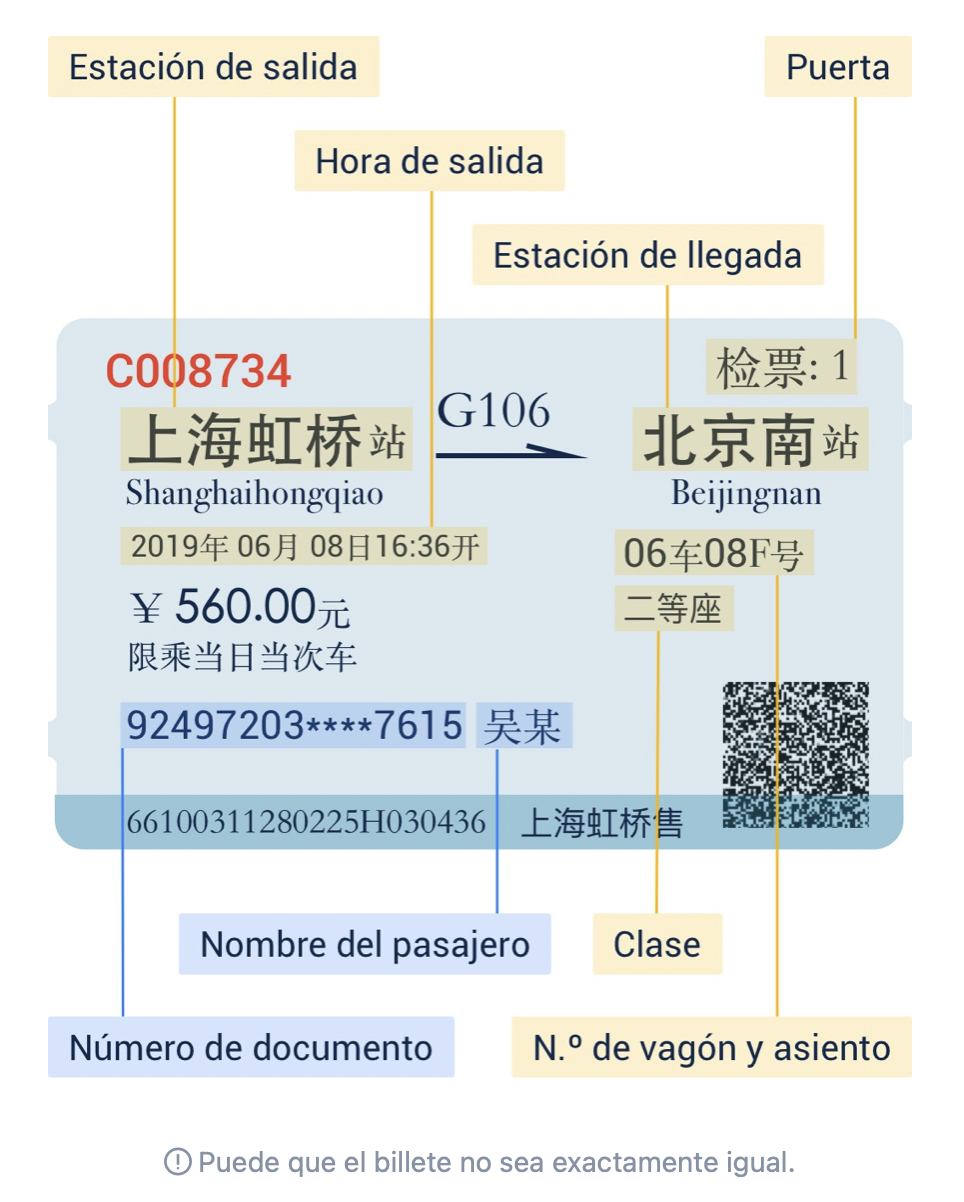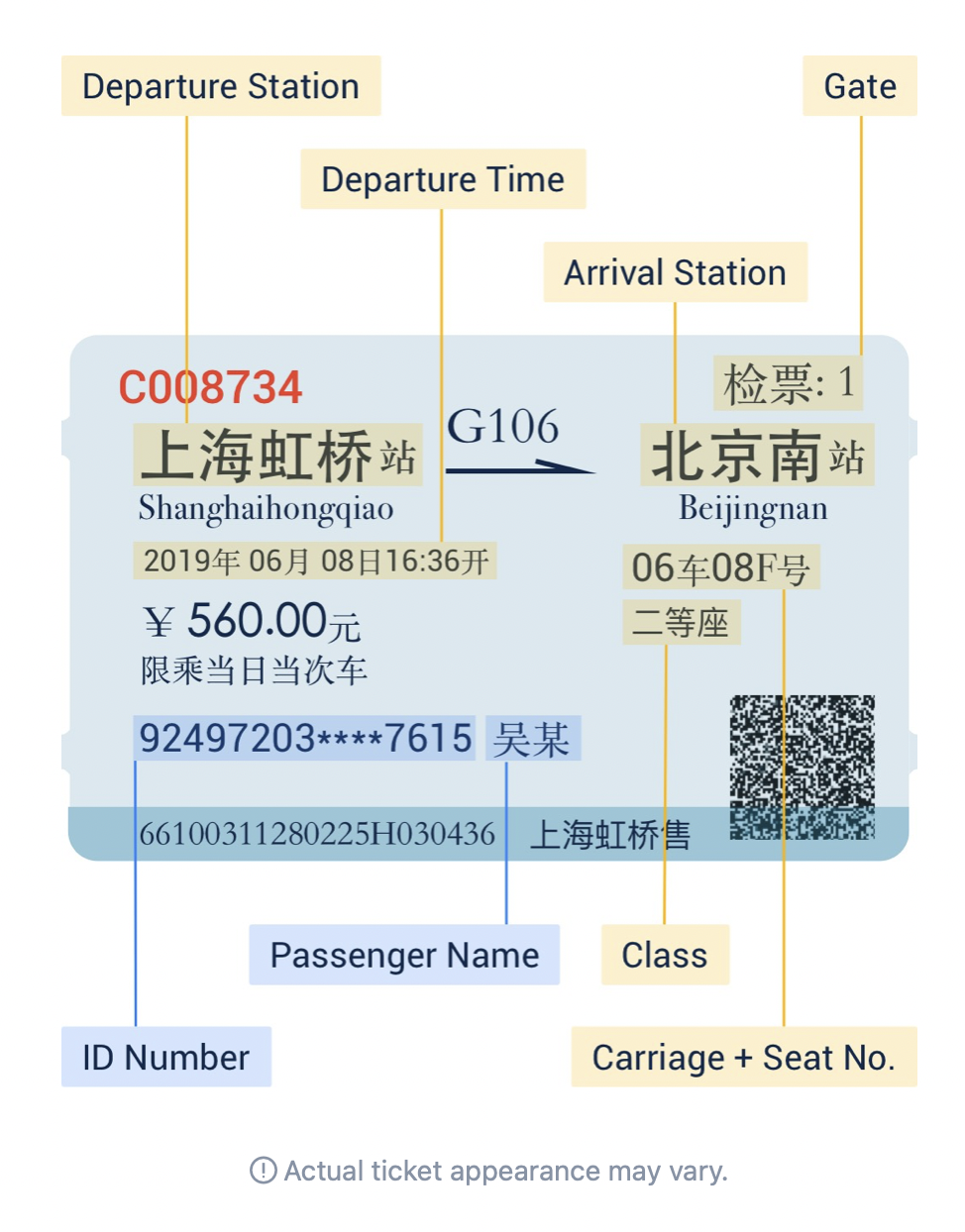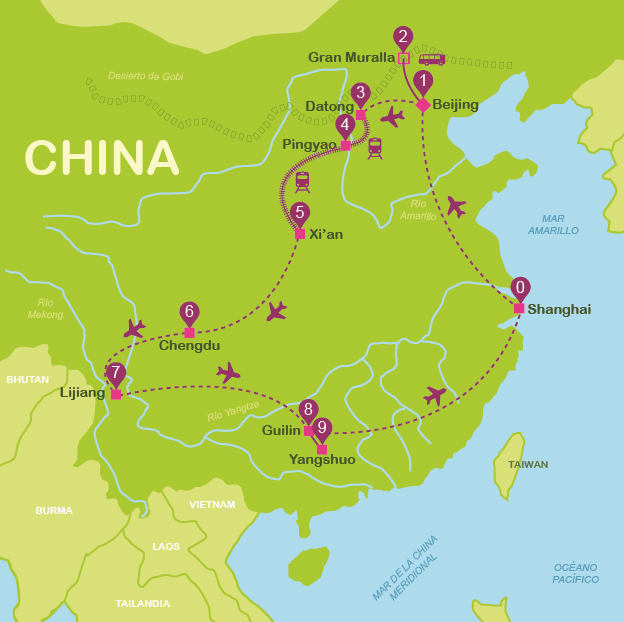How to move around in China:
The best way to get around China is by train and plane (generally safe and cheap, ideal for covering long distances).
Once in the cities, it's best to walk whenever you can, and to use the metro or a bike for longer distances. Taxis are extremely cheap compared to Europe, USA and Japan, though many taxi drivers will try and overcharge you. Always take official taxis with a meter or if not, negotiate the price beforehand, that is, if you can make yourself understood:-).
China by plane:
Flying is the best mode of transportation for covering the long distances in China. It's very similar to flying in the West, and you don't even need a printed ticket. All you need is your passport and they will give you a boarding pass during check-in.
It is recommended to arrive at the airport 1 hr 30 min in advance for domestic flights and 2 hr in advance for international flights.
In our Smart Route around China we include a link where you can find all possible flight combinations and can book your flight at the cheapest rate (SkyScanner). We also help you with the name of departure and arrival airports, something which in China can be the source of a lot of confusion.
How to buy train tickets:
Travelling by train in China is comfortable, cheap and safe. Don't expect luxury; trains are simple, though clean and respectable.
Most trains in China cannot be booked more than 5-10 days in advance. It's best to just go to the departure station 2-3 days in advance and buy the tickets directly. Availability shouldn't be a problem, unless it's the Spring Festival, 1 May or 1 October (see the Official Public Holiday Calendar). If this is the case, you better buy the tickets the first days they are for sale (18 days in advance in departure stations, 20 days in advance to buy them online). Some websites like Trip.com let yo book even more time in advance.
Tickets can be bought either going to a train station or through an authorized agency.
- Direct buy in a train station:
If you are in Shanghai or Beijing, you'll find ticket windows where they speak English (there are signs). In the rest of the cities, you'll need a piece of a paper with all your ticket information written in Chinese on it: point of departure and arrival, departure time, ticket number, ticket class. Ask someone at your hotel to write this information down for you. Passports and cash are a must to buy your tickets!
In case you prefer to buy the tickets in the station, we recommend you that once in Shangai or Beijing, you buy all the tickets you'll use during your trip. The tickets that don't departure from this station will have an extra charge of 5CNY but it's worth it to assure the availability in all the journeys. Bring printed or written down the details of the trains you want to take (date, hour, departure station, arrival station, type of seat) to make the buy easier. Don't forget your passports.
The train tickets in China can be bought about 2 weeks in advance in China Railway's official website www.12306.cn. However, this website is kind of a nightmare and you will have difficulties if you are not a Chinese citizen. That is why it's best to pay a specialized agency so they can make the reservation for you (even if you ask them to make the reservation more than 20 days in advance, they will keep you data and they will buy your tickets once they are for sale).
There are some important agencies that can do this (China Ticket Online, China Train Tickets, www.chinahighlights.com, Travel China Guide...) but our favorite one because of its good performance and low fee is Trip.com. It has the lowest commission (about 30CNY per ticket), the purchase is super easy and they have customer service in many languages. The ticket is purchased (or reserved) with a credit card, and in most cases they give you an electronic ticket, which you do not even have to print to board the train (in few cases you will have to present your passport and reservation number at the ticket office of the station so that they give you the physical ticket). They also have an app in which you can take all the electronic tickets to show them next to the passport when boarding the train.
These tickets can be returned or changed before the departure of the train, and only in the case in which the ticket has already been issued, they will keep the service fee (if you have only booked but they have not yet issued the ticket, they will refund everything). Here you have more information on how to make changes or returns.
Type of seats in Chinese trains:
There are 4 types of seats, although not every train has all of them:
- Soft sleeper: the most recommendable, especially if you have to spend the night on the train. Compartments with 4 beds in two bunks which convert into sofas during the day. They provide clean sheets, and the door locks with a key. If you aren't a group of 4, normally you end up sharing the compartment with other passengers (in general, Chinese are very civilized travellers). If you let the ticket inspector know and an empty compartment is available, you can change compartments and be alone (they prefer to avoid any altercations with tourists). Some compartments even have a TV and outlets for plugging in electronic devices. The restroom is shared and always outside the compartment.
- Hard sleeper: car filled with three-level bunks where everyone sleeps together. They also provide sheets and while the name seems to suggest the contrary, the mattresses are fairly comfortable. It's an experience, but the zero amount of privacy may scare some off. Few have outlets.
- Soft seat and hard seat: seats equivalent to first and second-class in Western countries. The first are individual seats and more comfortable. The second are usually cushioned benches for two.
While rare, some trains also have:
- 1st & 2nd class seats: same as soft and hard seats.
- 2-berth soft sleeper: same as soft sleeper but for two (perfect if you're travelling as a pair; this way, you won't have to share).
- Deluxe soft sleeper: like the above but with a private bathroom. Almost impossible to get.
Once on the train:
It's a good idea to arrive at the station more than 30 minutes ahead of time, especially in the big stations in Shanghai and Beijing. They're huge and have security checkpoints like in an airport.
Train announcement boards tend to be in Chinese, so it's best to go by the train number (written on the ticket) and the departure time. See bellow an image of a standard ticket for your reference.
Once on the train:
- Luggage: accompanies you in the compartment. There is a space for luggage above the door.
- Toilets: they always have toilets and lavatories (normally both Chinese and Western), but no showers. We strongly recommend bringing your own toilet paper. Toilets are located at the end of the corridor in each car.
- Food: usually each train has a food car. The food is more expensive and not as good, so we recommend eating lunch or dinner before getting on the train and bring snacks and something to drink with you.
- Smoking: permitted only in the vestibules between cars and in the food car.



